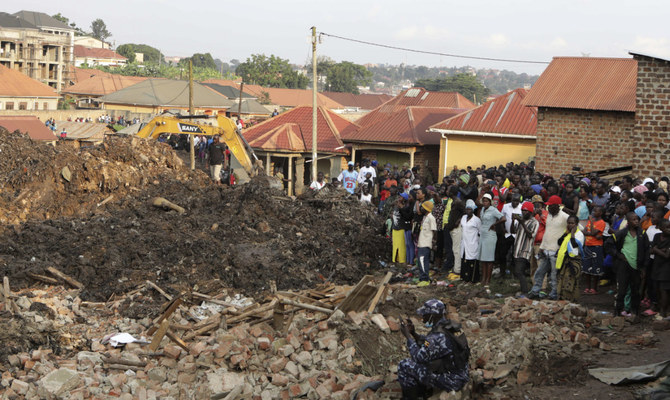KAMPALA, Uganda: A vast landfill site in the Ugandan capital has collapsed, killing at least 18 people, the Red Cross said.
Fourteen other people were injured when the Kiteezi landfill, which serves as a waste disposal site for much of Kampala, collapsed late Friday. At least two of the dead were children, Kampala Capital City Authority said in a statement.
The collapse is believed to have been triggered by heavy rainfall. The precise details of what happened were unclear, but the city authority said there was a “structural failure in waste mass.”
Irene Nakasiita, a spokeswoman for the Uganda Red Cross, said the toll reached 18 after more bodies were retrieved from the scene Sunday.
“The assessment is not yet completed,” she said, adding that rainfall was slowing the efforts of rescue teams digging through heaps of trash.
The Kiteezi landfill is on a steep slope in an impoverished part of the city. Women and children who scavenge plastic waste for income frequently gather there, and some homes have been built close to the landfill.
Kampala authorities for years have considered closing the site and commissioning a larger area outside the city as a waste disposal site. It was not clear why the plan has failed to take off since 2016.
Ugandan President Yoweri Museveni ordered an investigation into the incident, asking in a series of posts on the social platform X why people were living in close proximity to an unstable heap of garbage.
“Who allowed people to live near such a potentially hazardous and dangerous heap?” Museveni said, adding that effluent from the site is hazardous enough that people should not be living there.


At least 18 dead after landfill site collapses in Uganda’s capital
Short Url
https://arab.news/5vvmm
At least 18 dead after landfill site collapses in Uganda’s capital

- The collapse is believed to have been triggered by heavy rainfall
Russia urges restraint as Trump warns Iran of possible strike

- Flanked by Israeli Prime Minister Benjamin Netanyahu, Trump suggested on Monday that Tehran may be working to restore its weapons programs
MOSCOW: The Kremlin on Tuesday said it was necessary to develop a dialogue with Iran and urged all parties to refrain from escalation after US President Donald Trump said Washington would support another massive strike on Iran.
Flanked by Israeli Prime Minister Benjamin Netanyahu, Trump suggested on Monday that Tehran may be working to restore its weapons programs after a US strike in June. Iran denies it has a nuclear weapons program.
Moscow has cultivated closer ties with Tehran since the start of its war in Ukraine, and this year signed a strategic partnership treaty with the Islamic Republic.
Flanked by Israeli Prime Minister Benjamin Netanyahu, Trump suggested on Monday that Tehran may be working to restore its weapons programs after a US strike in June. Iran denies it has a nuclear weapons program.
Moscow has cultivated closer ties with Tehran since the start of its war in Ukraine, and this year signed a strategic partnership treaty with the Islamic Republic.
© 2025 SAUDI RESEARCH & PUBLISHING COMPANY, All Rights Reserved And subject to Terms of Use Agreement.











